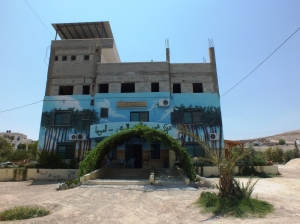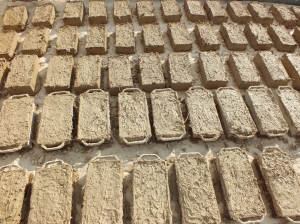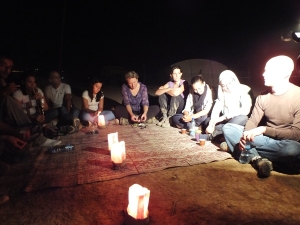
Located in the Jordan Valley, North of Jericho, the municipality of Auja is facing environmental problems which are not unfamiliar to the region. The greatest obstacle in Auja is water scarcity, which is clearly manifested in the diminished flow of the Auja Spring, the main water source of the municipality.
Historically, the annual Auja spring discharge average was 9.5 mcm/yr. In the last decade (as in previous drought years) spring discharge has been reduced substantially, negatively affecting agricultural products from the Auja community. The Auja spring discharge depends on both the current and previous years’ seasonal rainfall. These types of springs are very susceptible to a sequence of drought years.
Since the 1970’s the Israelis have been pumping water from deeper artesian wells near Auja spring causing lower water levels in the lower aquifer. Those lower levels could negatively affect the Auja spring’s discharge through increased leakage from the higher (spring) aquifer to the lower one. However, the lack of reliable measured flow rates from the last decade does not allow the verification of this assumption in a significant manner.
The consequences of this radical change in water flow is felt and seen in Auja. Most dramatic is the Auja village farmers, an overwhelming majority of whom were once involved in agriculture, but who have had to find other sources of income, often working at the nearby Israeli settlements, whose fields are irrigated by water reached via deeper wells near Auja. By visiting the village it is clear that there are a large number of barren farms, affirming the fact that water scarcity is a very grave situation for farmers indeed.

This is where the Jordan Valley Eco Center in Auja comes into the picture, initiated by Friends of the Earth – Middle East (FoEME). It is the first eco center in Palestine, which officially opened up in June 2010. The Eco Center aims to alleviate the consequences of water scarcity and environmental degradation in Auja through a range of activities. The center offers a series of demonstration centers of sustainable techniques such as grey water systems and solar panels in order to realize water and energy conservation.
Changes and improvements require time. However, despite its short life span, the center has grown quite rapidly. It has physically expanded with a third floor, a new kitchen and a large tent with traditional decorations. New mud houses are also under construction demonstrating traditional and ecological architecture. Moreover, the educational activities have increased considerably, especially for youth. Auja’s eco center has expanded its reputation. As a result the situation in Auja is receiving more external attention and presence than it did just two years ago.

Moreover, the eco center is expanding outside its own borders. Recently, there have been hikes and events to introduce the eco center and the problems in Auja to residents and visitors alike. One of the recent activities was the night hike on October 5th, during which locals and internationals had the opportunity to experience the darker side of Jordan Valley, learning about water issues and the current situation Auja farmers face. The night hike also included a surprise visit to the local date factory and drinking tea and coffee while listening to traditional Bedouin music. The next night hike will be synchronized with October’s full moon.
Another activity was on October 13th, where Educational Bookshop in Jerusalem hosted the Eco Center for a talk about the social, political and environmental problems in the Jordan Valley and different projects in the eco center that works to alleviate these impacts. In order to give the public an opportunity to experience what they learned, there was a hike offered on October 20th, for more information about this check our facebook page “Auja Environmental Center”.
Ultimately, the lack of water and the socioeconomic foundations of the community are still suffering and while there is still much left to be done, FoEME’s Auja Eco Center has initiated a path where environmental protection ultimately will generate a long-term sustainability in Auja.